- Getting around Lijiang. Dont stay in the Old Towns more than 2 days, there is nothing to do. KRISS Oct 9, 2013 05:46
- 2013 Beijing Temple Fair BENNYLAU Feb 26, 2013 03:29
- Malaysian traveling from KUL - LAX vis Shanghai PVG ZATI_DY Jan 3, 2013 20:15
Caravans and Cantaloupes
- Views: 4179
- |Vote: 0 0
- |Add to Favorites
- |Recommend to Friends
For more than four hours in air-conditioned comfort we had been climbing ever so slowly out of the depths of the Turpan basin, which at its lowest point is over 500 feet below sea level – the second lowest depression in the world. Hami for us was as welcome a sight, as it must have been over the centuries for caravans conveying merchants and travelers on the Silk Road. One must inevitably cross the Gobi desert to arrive here. This part of the Gobi is the formidable and often unforgiving Hami Basin nestled like a twin north and east of Turpan. Flanked by the rugged bare foothills beneath the three thousand-meter plus snow-capped peaks to the north and the south this wide variegated landscape stretches beneath clear blue skies as far as the eye can see.
The road for the most part is straight – it has few twists or turns as it follows the gentle contours of the dunes drifting over them like the ocean swell one after another sometimes carving a channel – a sheer sided canyon – through a ragged ridge that rises up to bar the way. Regular mileage markers, four digits long announce the remoteness of the place – over 4000 kilometers from Beijing. At shorter intervals stark white posts guard the gas pipeline buried underground, which hugs the highway close. It’s not a place you want to stop for long and we only made two. The first was a pit stop in a desolate, and all but deserted petrol station a couple of hours into the journey. The toilets were up the back, exposed – just whitewashed walls around deep holes in the ground, open to the sky. We ladies stood in line – a tidy queue in the only shade afforded by the screening wall.
It was hot and still outside. As I stood beside the road looking in the direction of Turpan, the black tarmac ribbon faded into a mirage – shimmering, mesmerizing – beckoning me back over the horizon into the desert’s deep depression. There is little sign of life. Not a blade of green dares to tango with the sun. While it was mid summer we had been fortunate to have a couple of cooler days but now as we approach Hami across this depression in the desert we know that hot, very hot is all we can expect for the remainder of our time in Xinjiang and Gansu – in fact it was hot everywhere we traveled in China that summer unless we were at altitude. Just like travelers before us we longed for this next oasis – the green, the trees, the shade, the cool, the water.
Hami has a wonderfully refreshing attraction that has added to its wide renown. From amongst the many crops grown in the area – wheat, corn, cotton, rapeseed, and fruit – the humble melon stands tallest. Out of these dry desert sands grows one of the choicest and sweetest melons made famous after the local Islamic king of Hami chose them as his gift of tribute to the Qing Emperor. In fact it was Emperor Kungxi who gave them the name Hami melon after finding that they had none. During the two month long, rugged camel journey to Beijing many of the melons did not survive. Even later when the length of the journey had been reduced to just two weeks by a horse relay courier service, just one variety outclassed all the others. The sweet Jiageda variety with its hard, checkered skinned satisfied the king of Hami with its hardiness and the Qing Court with its headiness. It’s now the most famous and popular of the thirty or so varieties of cantaloupes with sugar contents of between ten and eighteen percent. Just like the grapes of Turpan the cantaloupes of Hami are best sampled fresh from the farm.
We arrived around noon only to discover that there were only daytime buses twice a week to Jiayuguan, our next oasis and today there would be no bus. The alternative, an overnight sleeper coach did not interest us either. Having spent the previous evening sleeping rough under a spectacular million star sky in the desert near Huoyanshan (Flaming Mountains) we were all in need of a shower and a comfortable bed so I went in search of a hotel. The first person I asked indicated where I could find one and then walked with me all the way to the hotel reception to be sure that I found it. I booked a triple room – great value for money – in the Electric Power Hotel and caught a taxi back to the bus station to collect my mother, sister and our luggage. I expected the taxi driver to be waiting for me – after all I had not paid him but when we returned to the parking lot he with his taxi was nowhere to be found.
After freshening up we headed across town to the railway station in search of tickets out on the next available train. Again there wasn’t much choice and we came away with soft seat tickets on the following nights train departing at eight in the evening. After resting in the cool of our hotel room in the early afternoon we ventured out later in search of something tasty for dinner. With no plans other than to possibly spend a night in Hami before moving on we now had the whole day to explore but little information about the place apart from historical accounts by early missionaries working here or passing through during the early part of last century. We would take our time and be content with whatever we discovered around town. Just a few blocks from the hotel were the markets selling everything imaginable so we pottered through the stalls in the relative cool buying snacks for now and later on the train. We eventually emerged from the markets into a huge city square.
At first glance we wondered if we’d been morphed into France. Framed and almost dwarfed by tall weeping willows at the far end of the square stood a simile of The Arc de Triumph without the Champs Elysee of course but for a moment we thought we had stepped into Paris. A reality check soon brought us back to earth. Summer days in Xinjiang are long and it was still ‘warm’ in the late afternoon. We slipped into a shaded alley off to the left of the square lined with small outdoor diners each with three or four tables where we sat and ordered bowls of spicy noodles and spicy lamb kebabs, Uygur style.
Following our hot spicy dinner and sucking on smooth cool icecreams we wandered slowly across the square stopping every now and then to watch the locals. Several toddlers enjoyed the simplicity of slipping down the polished marble slope beside the stairs of the gardens central podium. Friendly greetings came often, interspersed with curious glances from happy, generous and friendly residents. Twilight came and went and as the curtain of darkness began to fall we were jovially invited to join a group of young adults eating and drinking and making merry at yet another outdoor diner by the back entrance to the gardens and the square. Under cover of darkness we completed our circuitous route back to the hotel looking forward to sleeping on a bed.
The following morning after breakfast at the hotel and a late checkout we went out in search of the post office to buy some stamps and post some cards. Walking to the left of the hotel, we passed by the markets again and continued on until this street crossed a new and wide boulevard lined with department stores and endless boutiques. We had stumbled into the new city of Hami, which has been rebuilt several times on the ruins of the old and completely relocated once. Turning right onto this main thoroughfare took us across the river and eventually curved around town to the railway station. By now the sun was high and we were hot. Across the river one of Hami’s many parks beckoned us with green and shady trees around a man made lake. What better place for us to rest and wait for our evening train departure?
A second ice block was almost more important than finding a cool spot to sit. Sprinklers and leaking hoses meant that there would be plenty of water to cool off with. We weren’t the only ones looking for somewhere cool and quiet to escape the heat. This end of the park contained kids rides, a merry-go-round and a shooting gallery. We had not been long there when a couple of youngsters approached us with shy smiles and lots of questions. Before long the two had multiplied to eight, with the one acting as their spokesman. In answer to our query of whether or not he liked learning English he gave an emphatic no but he also understood the advantages it would give him and so he did not pass up the opportunity we presented to practice with native speakers. My sister then got out some cute animal stickers which she had brought from home for just such occasions and with my dull nail scissors cut the sheets into enough pieces to share with all the kids as way of encouragement.
Further into the park we discovered a group of yurt style tents nestled under the spreading canopy of big old trees – the air temperature noticeably cooler. These popular semi-permanent outdoor teahouses offered a wonderful way to while away our time. Colourful Persian rugs covered raised platforms where clients lounged on cushions, sipping tea or beer and playing cards. Others relaxed on bamboo deck chairs around low tables enjoying the large delicious lamb kebabs barbequed on open braziers. We ordered kebabs followed by frozen yogurt – cool and tart – for our late lunch and were happy not have missed these treats.
From the trees the stains of music could be heard as a tutor and his students practiced in the shelter of the park pergolas. Finally it was time to make our way back to the station, retrieve our luggage, grab one last bite to eat and retreat to the relative cool of the waiting room. The prospect of six hours on soft seats arriving in Jiayuguan at two o’clock in the morning was not a good one but I’d take it any day in preference to six days or seven days tucked up between the humps of a camel.
With cooler weather, a more flexible schedule and time to explore, Hami offers a great variety of natural and historic attractions. The tomb of the Islamic king, ancient tombs with mummified bodies, beacon towers, temples, rock paintings, mysterious stone sculptures, and whispering sands are just a few all within easy access in and around Hami.



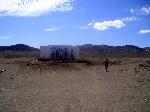
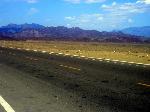
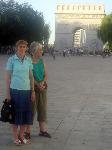
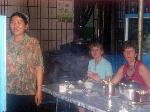
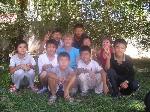
 Copyright © 1998-2026 All rights reserved.
Copyright © 1998-2026 All rights reserved.
1.
Feb 6, 2007 12:13 Reply
CHYNAGYRL said:
that's a very nice story. Thanks for sharing it with us! (and that sitting between the humps of a camel sounds very uncomfortable)